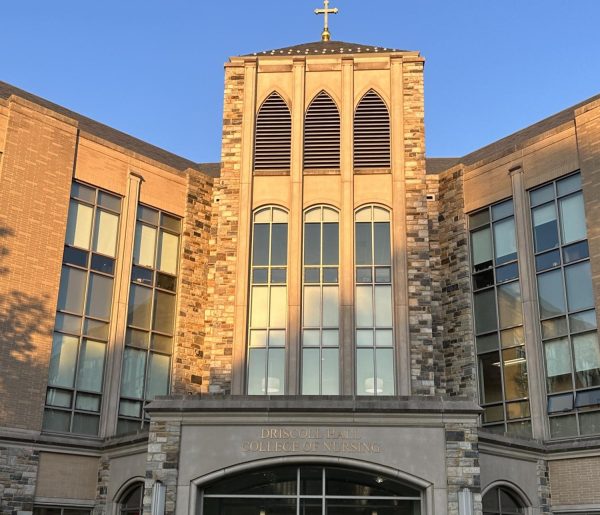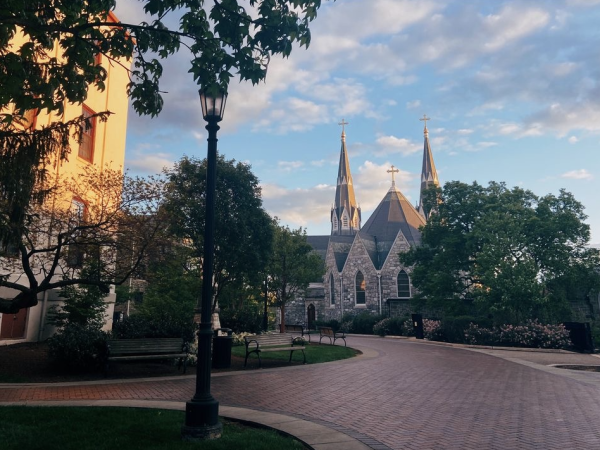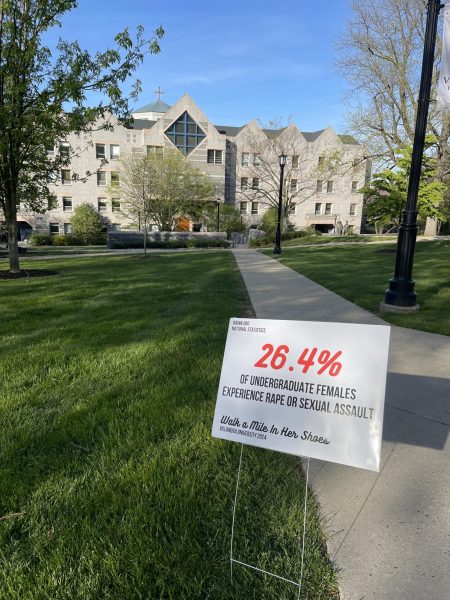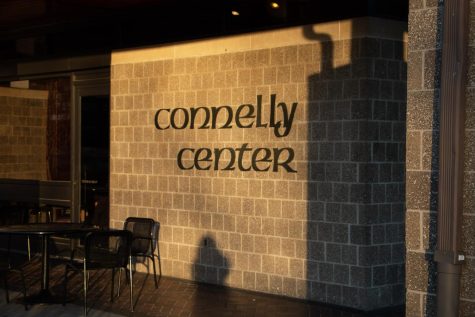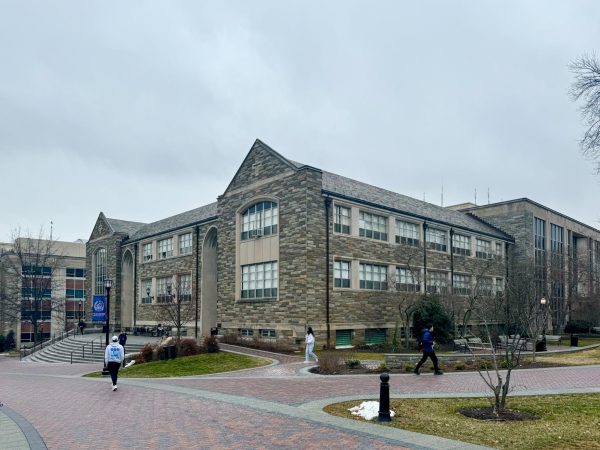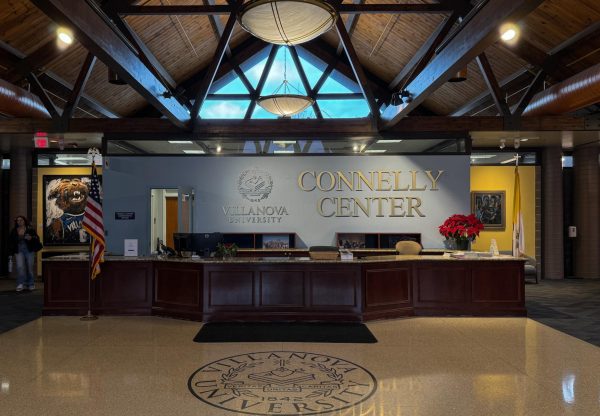Special Report: Mental Health On Campus
May 1, 2019
You can read our letter from the editors about the publication of this special report here: https://www.villanovan.com/news/letter-from-the-editors-our-special-report-on-mental-health/article_c63cd50e-6c1c-11e9-bd46-9b1fb8d4664b.html
You can hear from seven Villanova students who shared their perspectives on mental health here: https://www.villanovan.com/news/mental-health-on-campus-villanova-students-share-their-stories/article_89ead230-6c2c-11e9-80ce-27b7ff28c413.html
On March 22, University President Rev. Peter M. Donohue, O.S.A., Ph. D. sent a mass email to the Villanova community. “As a community, we quickly acknowledge good physical health,” Donohue wrote, “but we must also be a champion for good mental health. I know there are times when community members experience academic or social challenges; moments of personal struggle that are hard to admit; and instances of being excluded—intentionally or unintentionally.”
Donohue’s email followed the deaths of two University seniors, one in December and another in February, both of which are thought by many to have been suicides. (The University has not confirmed the cause of death of either student and has cited that they have not received the coroners’ reports.) The loss of those students has prompted many students across campus to push for a more genuine conversation about mental health and improved resources on campus. Although in recent years, many have pointed towards a positive shift in mental health awareness, both on campus and more broadly in society, students and administrators believe that there is still room for improvement.
“I definitely think it’s evolving,” sophomore Sierra said, “but I still think we have a far way to go. We still have to push this.”
(All students referred to by first names requested to be referred to by pseudonyms. All others are referred to by their actual names.)
A number of community members said combatting an existing on-campus culture at the University that proliferates perfectionism and a constant smile is vital to igniting conversations about mental health.
“Villanova has a whole culture of being super happy and super competitive and perceptions, like ‘you have all of your (expletive) together’ kind of thing,” junior Eileen Gaffney said. “So it almost seems impossible to have something wrong or be struggling with something.”
Kathy Byrnes, the Associate Vice President for Student Life and a member of the CARE (Students of Concern and Review) Committee, a group of faculty and administrators dedicated to providing a caring response to students of concern, acknowledged these sentiments.
“Students at selective schools [such as Villanova] can feel a tremendous pressure to kind of be perfect, to not share when they’re not having that good day,” Byrnes said. “I’m not going to share when things aren’t going well. And so, then, that just exacerbates their feeling lonely or isolated or [that] nobody else knows how it feels to be me.”
“Sometimes, this school can have a reputation for wanting everything to seem perfect,” senior Haley said. “I think creating an environment around discussing whatever you are going through is the first step, because people need to be able to talk about it.”
55% of students report utilization of the University Counseling Center at some point during their time at Villanova
In his email, Donohue highlighted the University Counseling Center, which offers free, confidential personal counseling services to students as one of the University’s main resources.
Though its utilization may not always be evident, the Counseling Center does interact with a significant portion of students. According to Joan Whitney, Ph.D., Associate Vice President and Executive Director of the Counseling Center, 55% of students reported in the senior survey that they have been to the Counseling Center, and 85% of those students said that they were very satisfied with their experience.
“I’m so grateful for the Counseling Center,” junior Emily said. “Times can get pretty hard. I would say the only thing that has made it better was going to talk to a counselor and knowing that I have my friends behind me.”
Junior Jeff Lieto credits the Counseling Center with being the driving force behind him getting the help that he needed to deal with depression. “Part of the reason that I was able to get help was being at school,” he said. “They were really the first ones to call my parents to tell them what was going on. I couldn’t do it on my own.”
Still, others said there are issues with specific realities at the Counseling Center.
“A big problem for me is that there’s no counselors of color,” Sierra said. “Not that I didn’t feel welcome, but I didn’t have that instant bond. I know for a lot of people, that’s been a deterrent, because there’s no counselors of color, so we don’t really see ourselves there.”
Whitney said the Counseling Center has been mindful of creating a more diverse group of counselors. “We’ve tried to have diversity, and it’s really hard because the number of culturally diverse psychologists of the quality that we want to have [are] snapped up readily,” she said. “But the good news is that we’ve just succeeded in making two hires. One is someone who’s a native Spanish speaker who’s from South America, and the other is African American, and they’ll both be starting in August.”
Sophomore Sally McNamara pointed towards a concern that students commonly express about a policy that allegedly refers students out to off-campus counseling resources after they have attended ten sessions at the Center. “The reason the Counseling Center is so great is because it’s free,” McNamara said. “So, for a lot of kids, maybe you can’t afford going off campus or going off campus is a lot.”
Freshman Daniel said he had positive experiences when he attended sessions at the Center, but lost trust in the Center after a series of canceled appointments.
Whitney said while the Counseling Center has a short-term focus, it doesn’t have a set maximum number of sessions per student.
“It’s not like you’ve reached “X” number of sessions and [then] you need to be referred off campus,” Whitney explained. “But one of the conversations we will have is [whether] you would like untimed, [off-campus] counseling.” She said the average number of sessions that students attend is five.
If a student wishes to explore the opportunity for long-term counseling, the Counseling Center helps to actively facilitate that potential transition by finding services that are covered by the student’s insurance and assisting the student with conversations with family members if needed. Whitley emphasized that it is a small proportion of University students who elect for long-term counseling.
One reason behind the short-term focus of the University’s Counseling Center is to retain the ability to open their doors to a large number of students. “If you do provide unlimited counseling, 10% of the students take up 90% of the counseling sessions,” Whitney said, “So there’s a real unfairness about that, because whoever comes through the door first gets counseling, and then it gets completely full. It’s a priority for us not to keep people waiting a long time for their first appointment and then their ongoing appointments.”
Students typically wait about a week for their first appointment, and the Center also reserves a number of appointments every day for students with urgent needs.
A push for broader resources
Many students hold a belief that improving the environment for students struggling with mental health goes beyond just the resources provided by the Counseling Center. In particular, a number of them pointed towards a need for better channels to communicate about mental health with University professors.
“When I have had really rough times, I have been hesitant to tell my professors,” Emily said. “If someone had a broken leg, everyone would obviously understand what is going on. Oh, you need crutches, the elevator. But if someone has something like depression, you can’t always see it. It’s harder to make your needs known and it’s embarrassing for some reason.”
“It’s not normalized to really take care of your mental health,” McNamara said. “It’s not normalized to email a teacher and be like, ‘I am not okay right now. I cannot turn in this paper. I cannot turn in this test or I can’t take this exam.’”
While some students have said they been invited by professors to discuss things that they are dealing with during office hours, others said they have encountered professors who are unreceptive to discussing or accommodating their struggles.
“I think teachers need to be more aware of mental illness and mental health,” Sierra said. “I had some teachers who didn’t care. They just wanted me to go to class.”
McNamara said she thinks academic advisors should also be involved in improving the channels of communication, especially after the recent student deaths.
“I really would have liked to see like more individualized, specific check-ins on students,” she said. “You know, maybe if all the advisors were like, ‘Hey, how are you doing?’ Not just like what we’re going to pick for classes.”
The University is implementing a program in September in the hopes of addressing concerns like these. The program is named QPR, which stands for “question, persuade, refer,” and will train faculty and administrators in ways to discuss these personal, yet imperative mental health topics with their students. Essentially, it tasks the trained individuals with helping to connect students with the resources that he or she needs, not just as a student, but as a person.
“It’s to get people to not be afraid to talk with other people about how you’re really doing,” Whitney said. “To be able to have a conversation and not feel like they’re intruding on the other person. And if the person says, ‘I’m not doing so well,’ to be able to say, ‘Tell me about it. I’m interested. I care.’”
Similarly, Byrnes highlighted resources in the academic setting that students can approach. “What we want to do is make sure students know they can go to, whether it’s their academic advisor, their academic dean or the dean of students,” Byrnes said. “Those would be the main administrative arms that students [should approach] if they feel like they need something, and they’re not getting it.”
A chain reaction
Although the general sentiment indicates that the stigma surrounding mental health is diminishing, some students still pointed towards alarming examples of negative attitudes towards mental health expressed by their peers.
“There are people on this campus who have called me psychotic and crazy,” senior Will Summers said. “And then, have said that I’ve been vocal about it for show and for attention.”
“The Barstool ‘Nova (Instagram) account posted a suicide joke the day after one of the students at Villanova committed suicide,” Lieto said. “It’s not something to be joked about.”
Students expressed a belief that a continued push to normalize conversations about mental health is crucial to eliminating these stigmas and insensitivity, as well as to helping others who are struggling with mental health issues.
“You don’t know how many people are experiencing mental illness until you actually have a conversation with someone,” McNamara said. She spoke of an experience where a friend said McNamara’s own references towards attending therapy and taking medication during everyday conversation helped to normalize the topic and prompted her to seek help.
“Seeing some of my friends that deal with it, they’ve opened up about it, and then I think it’s just kinda like a chain reaction,” Summers said.
Gaffney referenced the recent rise of the Instagram account @TheQOLProject (the Quality of Life Project), which spotlights Villanova students sharing their perspectives and speaking openly about their personal journeys, as an example of a shift towards more authentic on-campus conversation.
Junior Katie Eamer said even those who can’t personally relate to struggles with mental health can make an impact by supporting their friends and peers. “Saying, ‘I recognize that you’re struggling. I don’t personally relate to this, but I’m going to do what I can to make sure that you feel comfortable,’ or asking, ‘What can I do to help you out if you need something?’ makes a difference,” she said.
Summers said he hopes that supporting those who deal with mental health issues can become a priority for all community members and not just in the wake of tragedy. “My biggest thing is that it shouldn’t take someone dying to start caring,” he said.
“Don’t be afraid to ask.”
Amidst the array of shared feelings and varied perspectives shared by the students and administrators, a universal sentiment was conveyed by all: Ask for help if you need it.
In his email, Donohue called on students to reach out to campus members and resources, such as the Counseling Center, Campus Ministry and Resident Assistants, for the help they need. “Whatever the case may be, I implore you to speak up and seek help if you are struggling in any way,” he wrote. “Please, don’t be afraid to ask.”
Byrnes also spoke to the importance of checking in on friends and peers who seem to be struggling: “If you’re worried about somebody, say something to someone, because that, literally, has saved lives many times over the years.”
“It gets better,” Emily said. “There is a way to get better. And if there is anyone out there struggling, people care about you. I think it’s really easy to get into the mindset that no one cares and that you mean nothing to anyone, but you do. Seek help, because you deserve it.”
Emily Cox and Erin Gormley contributed to the reporting of this article.



